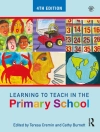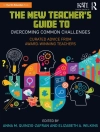The key to effective classroom management starts with instruction
Every teacher knows that the perfect lesson plan is useless without effective classroom management. But what’s the best way to foster student engagement, differentiate instruction, handle disruptive students, and promote positive behavior? The answer is in how you teach.
Teaching Behavior goes well beyond setting classroom rules, communicating consequences, and providing the usual tips on engaging students and building relationships. It draws on the most current evidence-based practices and rich, real-world examples to get to the heart of effective teaching. A national expert in behavior and special education, Terry Scott shares clear, detailed and proven instructional strategies to maximize student success. Teaching Behavior is ideal as a teacher guide or textbook, offering
- New insights on why instruction is the foundation for all student behavior
- Practical tools for managing all types of students and classrooms, including the most challenging
- Self-assessment checklists and discussion questions for teacher book-study groups
Wherever you are in your teaching career, Teaching Behavior will give you the innovative, day-to-day tools to conquer the toughest behavior challenges and make your classroom more effective and fun — for you and your students.
‘Terry Scott provides numerous suggestions for educators who want to teach students ways to address their behavior in order to have a positive impact not only on the students’ conduct but ultimately on their academic success.’
Marcia B. Imbeau, Ph.D., Professor
University of Arkansas
‘Classroom management is, was, and always will be, of concern to educations. Teaching Behavior is a great springboard for focused dialogue between experienced and beginning teachers on this topic.’
Sandra Moore, ELA Teacher
Coupeville High School
قائمة المحتويات
Preface
Section I: Behavior and Instruction
1. The Teacher Defined
What it means to be a teacher
2. Effective Teachers Provide Effective Instruction
Teachers use effective practices
3. Evidence, and Probability in Defining Effective Teaching Practice
Some things work better than other things
4. Behavior
Communicating about what students do and don’t do
5. Assessing Behavior
Knowing why behavior happens so we can identify what to teach
Section II: The Daily Grind
6. Setting up a Classroom
Arranging environments to predict maximum success
7. Planning Instruction I: The Learner
Planning for what to teach and gather materials
8. Planning Instruction II: The Lesson
Planning and sequencing examples for instruction
9. Presenting Instruction
Providing effective and engaging instruction
10. Providing Consequences for Behavior
Feedback as an essential part of instruction
Section III: Individualized Strategies
11. Measuring Behavior
Assessing the degree to which instruction has been effective
12. Systems, Tricks, and Strategies in the Classroom
a. Ignoring Game
b. Group contingencies
c. Behavior Momentum
d. Choice
e. Differential Reinforcement for Inappropriate Behaviors
f. Differential Reinforcement for Extreme Behaviors
g. Differential Reinforcement for Too Frequent Behaviors
h. Good Behavior Game
i. Positive Peer Reporting
j. Self-Management
k. Token Economies
l. Phase Level Systems
13. Responding to Escalations and Crises
a. Basic Considerations
b. Non-Compliant and Defiant Behaviors
c. Disrespectful Behavior
d. Disruption
e. Provocative Behavior
f. Fighting and Aggressive Behavior
Checklist for Effective Teaching
References
Index
عن المؤلف
Terrance M. Scott is a senior principal education researcher at the Stanford Research Institute (SRI). Before joining SRI in 2020, Dr. Scott spent 24 years as a professor and researcher in special education. He began his career as a counselor in residential treatment and has worked with students with challenging behaviors across a variety of settings. Since receiving his Ph D in Special Education at the University of Oregon in 1994, Dr. Scott has written over 100 publications, has conducted well more than 1, 000 presentations and training activities throughout the United States and across the world, and has successfully competed for more than $24 million in external grant funding. In 2004 he received the Distinguished Early Career Award from the Research Division of the International Council for Exceptional Children, and in 2012 he received the Outstanding National Leadership Award from the Council for Children with Behavior Disorders. He was elected president of this organization in 2013 and served as a two term editor of the journal, Beyond Behavior. His research interests focus on schoolwide prevention systems, the role of instructional variables in managing student behavior, functional behavior assessment/intervention, video-based training for school personnel, and scientific research in education.












